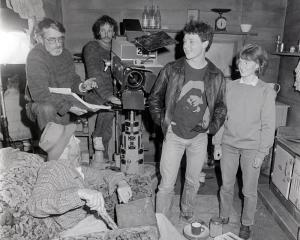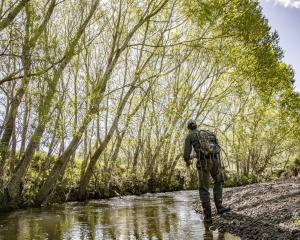
I see from recent news (ODT 10.10.25) that Queenstown’s feral goats have been making the headlines once again, with a 20-plus herd on a romp in search of gourmet garden delights just above the CBD.
I say "once again" because goats seem to have had a run of the town for well over 160 years, going on news reports and complaints in letters to the editor in the 1860s and 1870s.
Goats have long been gazetted as a "nuisance". The Municipal Ordinance 1865 allowed for any goat found in any public square or enclosure within the town boundary to be seized and destroyed.
Under a heading of "The Goat Nuisance", one correspondent in an 1874 edition of the Lake Wakatip Mail, signing himself as "A Sufferer", complained of goats being allowed to wander through the public streets all hours of the day, breaking fences and destroying gardens.
A couple of weeks later, another letter to the editor pointed out that some 500 wild goats were eating up the grass in the Queenstown Commonage and this "Old Resident" wanted a ranger appointed to rid the town of those "useless pests".
In an 1876 edition of the same newspaper, a "Ratepayer" protested about damage to the local cemetery by goats — "desecrating those little plots, beneath which some dear beloved relative lies".
That correspondent blamed locals who kept goats for family use and were in the habit of turning them loose on the terrace near the cemetery, where the pests were claimed to have destroyed hundreds of recently planted trees.
The problem of feral goats got a lot worse. By 1920, it was reported that around 30,000 feral goats were creating havoc in the region between Lake Wakatipu and Lake Wanaka.
In a 1936 letter to the editor of the Lake Wakatip Mail, one correspondent took a light-hearted approach to the problem by writing a little ditty, its opening verse being: "Queenstown has its little jokes, I know they’re hard to beat; But what about the billy goats that live down Stanley Street!"
And did you know that Queenstown’s longtime resident goats have been enshrined in literature?
They feature in a short story, A Colonial Banshee, written by Fergus Hume and first published in December 1893 in Clyde’s bi-weekly newspaper, the Dunstan Times.
Fergus Hume was famous for his 1886 crime fiction bestseller, The Mystery of a Hansom Cab, which became an instant success, selling hundreds of thousands worldwide, and is embraced today as an Australian classic. New Zealand claims him too, and rightly so.
Fergus came to Dunedin from England as an infant in 1861. He was educated at Otago Boys’ High School and studied law at Otago University before leaving for Melbourne in 1885 when he was 25.
He went on to write over 140 novels, but it appears that his A Colonial Banshee short story was the only one with a New Zealand setting, Queenstown in fact.
It is a ghost story with an Irish twist, but Queenstown’s feral goats do play a part. Its protagonist, a Mr Durham, was exploring the winter landscape but spent much time dodging the great many goats wandering the main street and outskirts of the town.
He relates: "You walked down the main street, and in two minutes found yourself among the hills — and goats. You surveyed a palatial hotel of the most approved ‘Grand’ type and turned around to behold a goat-populated section gaping between a red brick chapel and a corrugated iron store."
On the outskirts of the town, he says, "sometimes in such a place you met a man, more often a goat. I preferred the former myself, as he sometimes invited me to have a drink, whereas the goats were all distinctly hostile. They are the most distrustful animals I know. "
But back to the present day.
I do feel sorry for those garden-proud residents who wrote to the council to raise their concerns about the herd of feral goats regularly making a beeline for their property.
It seems the council’s hands are tied as they can only control the goats within their own specified reserves where they carry out an annual cull.
In the meantime, these Queenstown homeowners must man the barricades to defend their garden property against this band of picnicking pests in search of a tasty side salad.
As sure as eggs, if these feral goats have free rein in your garden, they will clean it out as fast as a ferret in a fowl house.
• Tony Eyre is a Dunedin writer.











